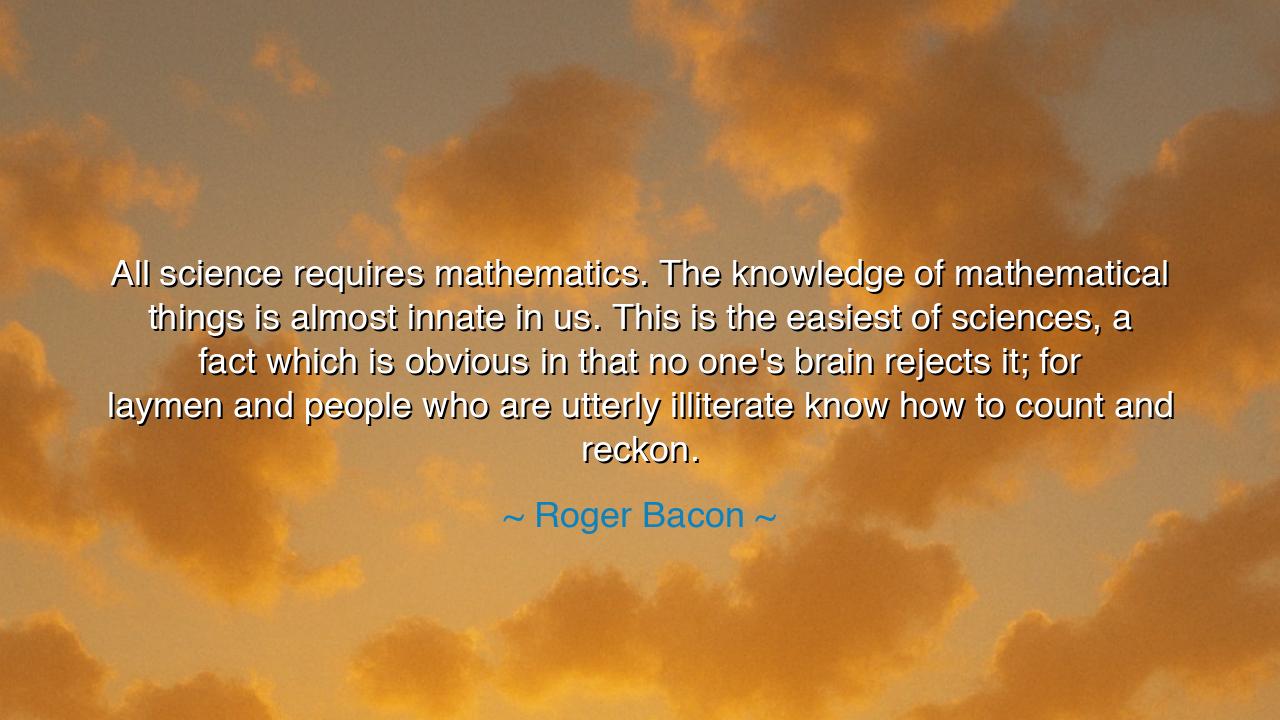
All science requires mathematics. The knowledge of mathematical
All science requires mathematics. The knowledge of mathematical things is almost innate in us. This is the easiest of sciences, a fact which is obvious in that no one's brain rejects it; for laymen and people who are utterly illiterate know how to count and reckon.






“All science requires mathematics. The knowledge of mathematical things is almost innate in us. This is the easiest of sciences, a fact which is obvious in that no one's brain rejects it; for laymen and people who are utterly illiterate know how to count and reckon.” Thus declared Roger Bacon, the thirteenth-century philosopher and scholar, whose spirit blazed like a torch amid the long night of the Middle Ages. His words are not merely a defense of mathematics, but a revelation of its sacred nature — that it is not a craft invented by men, but a truth woven into the very fabric of the human soul. In his vision, mathematics is the universal language by which creation itself speaks; to know it is to hear the rhythm of the cosmos, and to walk in step with the mind of the Divine.
Bacon, often called Doctor Mirabilis — the “Wonderful Teacher” — lived at a time when superstition and ignorance still clouded the minds of men. Yet he saw clearly what few dared to see: that the path to wisdom lay not in blind faith alone, but in observation, reason, and number. To him, mathematics was not cold calculation, but the pulse of reality — the bridge between the seen and the unseen. He declared that “all science requires mathematics” because he understood that every law of nature — the orbit of the stars, the fall of the rain, the growth of the seed — unfolds according to a numerical harmony. The world, in his eyes, was a vast equation written by the hand of God, and man, through the gift of intellect, was invited to read it.
When Bacon says that the knowledge of mathematical things is almost innate, he touches upon something profound and eternal: that within every human being lies an instinct for order. Even the simplest of minds can distinguish one from two, more from less, balance from imbalance. This is no accident, but a reflection of the order that pervades the universe. The shepherd who counts his flock, the merchant who measures his wares, the child who divides his bread — all are participating in a sacred act of understanding. They are not learning something foreign, but awakening to what their spirit already knows: that number is the root of knowledge, and reason is the light by which we comprehend creation.
Consider the great Pythagoras, the ancient sage who first declared that “All is number.” He taught his followers that every harmony of sound, every proportion in art, every movement of the stars followed a hidden numerical pattern. From his school emerged not merely geometry, but philosophy itself — for he saw that to understand mathematics was to glimpse the divine architecture of the world. Centuries later, Bacon would echo this same truth, standing in the line of those ancient seekers who knew that to count rightly is to think rightly. From the temples of Greece to the monasteries of Europe, the same flame passed from hand to hand: that mathematics is not mere tool, but revelation.
And in this revelation lies both humility and wonder. For when man begins to study mathematics, he discovers not his own greatness, but the greatness of the universe. He learns that the same principles which govern his counting also govern the stars. The formula that describes the curve of a river also describes the orbit of a planet. In this unity of pattern, we find a truth older than time: that knowledge is not divided, but one. Thus, Bacon reminds us that to study mathematics is to align our minds with the harmony of existence itself — to learn, in small measure, how to think as the Creator thinks.
Let us not, then, mistake Bacon’s words for mere academic praise. His message is spiritual as much as intellectual. When he says that “no one’s brain rejects mathematics,” he means that reason is our common inheritance — that every human being, whether scholar or shepherd, bears within him the seed of understanding. Education, therefore, is not the imposition of learning, but the awakening of this inner light. The wise teacher does not give knowledge as if it were foreign coin, but draws it out as water from a deep well. And mathematics, being the most natural of sciences, is the first path by which this inner fountain begins to flow.
So, my children, take this as both lesson and exhortation. Do not fear mathematics, nor dismiss it as a cold or distant art. Approach it with reverence, as the ancients approached the stars — for in its patterns lie the footprints of eternity. Count not merely with your hands, but with your heart. See in every equation the whisper of order, in every proof the echo of truth. For as Roger Bacon taught, to know mathematics is to know the key to all other knowledge, and to reject it is to turn away from the very structure of reason itself.
Let your minds, then, be open to the harmony of number and law. Seek to understand not only how the world moves, but why it moves as it does. Learn the patterns, trace the order, and let your intellect reflect the divine symmetry that shapes all things. For in that pursuit — in the humble study of mathematics — you will find what Bacon and the ancients found: that wisdom is not merely the possession of knowledge, but the awakening of the soul to the hidden unity of all creation.






AAdministratorAdministrator
Welcome, honored guests. Please leave a comment, we will respond soon